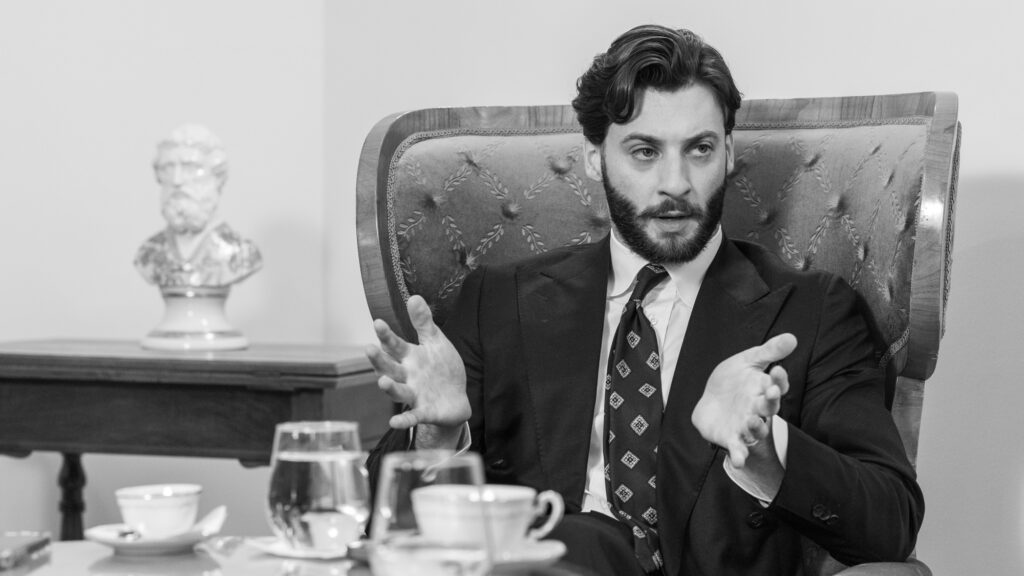In a world of strictly sensationalist documentaries on the topic, Uncomfortable Truths: The Reality of Gender Identity Ideology stands out for its largely measured and thoughtful tone. In this documentary, filmmaker Travis Brown offers an unflinching look at how gender ideology has reshaped institutions, language and identity, too often without meaningful public scrutiny.
Screened at the Danube Institute on 6 May 2025, the film presents gender ideology as a political belief system with religious characteristics: emotionally compelling, resistant to scrutiny and enforced through social pressure. The screening was followed by a discussion between Travis Brown and Rod Dreher.
Gender ideology, broadly defined, holds that being a man or a woman depends on internal feeling rather than biological sex. This shift undermines science, suppresses dissent and causes lasting harm to young people. The present article explores the film’s main themes and outcomes of the discussion at the Danube Institute: gender ideology’s cultural ascendancy, its medical consequences, and the struggle for moral and institutional renewal.
Ideology Beyond Biology
Uncomfortable Truths presents a stark account of how gender ideology has redefined what it means to be male or female. Gender critical activist Helen Joyce and evolutionary biologist Colin Wright emphasize that sex is an immutable, biologically evolved category, yet note that this basic fact is increasingly dismissed in public discourse.
This phenomenon can be traced back to the influence of postmodern thinkers such as Simone de Beauvoir and Michel Foucault, who reframed gender as an internal identity detached from the body. Joyce defines gender ideology as the belief that ‘man’ and ‘woman’ are feelings rather than realities.
She and others warn that this shift replaces empirical truth with self-declared identity, creating a cultural climate where biology is sidelined and dissent is punished. The result, they suggest, is not merely theoretical confusion but a practical erosion of reality that underpins policies and norms with far-reaching personal and societal consequences.
Travis Brown draws a comparison between gender ideology and the fundamentalist Christianity of his upbringing, where questioning doctrine results in ostracism. Buck Angel, a transsexual man, describes the movement as cult-like, demanding constant affirmation and punishing dissent.
‘Whether God, money, or ideology; humans inevitably seek connection to something greater’
Psychotherapist Lisa Marchiano observes that many young people drawn to transition are intelligent, reflective individuals seeking transcendence. She references David Foster Wallace’s claim that ‘everyone worships’, whether God, money, or ideology; humans inevitably seek connection to something greater. In the absence of traditional religion, gender ideology often fills that void. Rod Dreher links this to Philip Rieff’s The Triumph of the Therapeutic (1966), which describes how Western societies came to prioritize emotional comfort over moral truth.
The emotional appeal is strong, with activists asking parents such questions as: ‘Would you rather have a living daughter or a dead son?’ Gender ideology thus functions as an imperious belief system, exploiting compassion to wear down parental vigilance.
In the follow-up discussion, Travis Brown would point to social media as a central force in spreading gender ideology, describing it as a disorganized form of brainwashing that isolates children and encourages them to equate online personas with real identity.

In the film, Founder of Transgender Trend Stephanie Davies-Arai calls the phenomenon contagious, particularly among teenage girls who document and share their transitions online. She likens it to a meme, nurtured by the internet and reinforced through peer influence in both digital and school settings.
Professional Counselor Sasha Ayad compares this pattern to well-documented cases of mass psychogenic illness, where symptoms such as fainting or vomiting spread rapidly through suggestion, especially among adolescent girls. She emphasizes that the experience feels authentic to those affected, even though its origins are social. Buck Angel describes the online environment as manipulative and dangerous, accusing it of promoting lies to children and bypassing the role of therapy. According to Brown, these platforms do not merely reflect culture but actively shape and direct it.
The Debate on Youth Transition
Travis Brown draws attention to the sharp rise in adolescents diagnosed with gender dysphoria and fast-tracked into medical intervention, often with minimal psychological assessment. Psychotherapist Lisa Marchiano warns that genuine therapeutic inquiry is being replaced by automatic affirmation, which bypasses the exploration of underlying emotional issues.
Sasha Ayad observes that gender distress is increasingly treated in isolation, detached from the broader context of adolescent development and identity formation. Founder of Genspect Stella O’Malley highlights the emergence of a new cohort, here as well of primarily adolescent girls and often on the autism spectrum or dealing with other conditions, who become fixated on transitioning after extended exposure to online content.
This pattern gave rise to the term ‘Rapid Onset Gender Dysphoria’. Psychoanalytic psychotherapist Sue Evans voices concern that clinicians raising objections are ignored, while her husband Marcus Evans, who works in the same field, describes a professional climate in which challenging the prevailing approach is met with accusations of transphobia. Together, their accounts portray a medical environment drifting away from caution and into ideology.
Lisa Marchiano explains that traditional therapy is rooted in curiosity, critical thinking and the compassionate examination of a patient’s beliefs. She argues that ‘gender-affirming care’ abandons these principles, replacing them with unquestioning validation that can lead minors toward irreversible medical procedures.
Buck Angel expresses concern that a diagnosis of gender dysphoria is no longer required to begin transition, likening the current model to customizing a car without ever checking the engine. They warn that such practices address surface-level discomfort while neglecting deeper psychological issues.
Travis Brown and Marcus Evans describe a climate within the therapeutic profession where raising concerns about this approach results in social and professional consequences. Ayad adds that even cautious dissent is frequently interpreted as harmful, rather than as part of responsible care. Their combined testimony points to a broader shift away from therapeutic integrity and toward ideological conformity within the mental health field.
In the film, detransitioner Camille Kiefel shares her deep regret over undergoing a double mastectomy and speaks about the ongoing psychological burden she carries. Sue Evans describes encounters with detransitioners as heartbreaking and warns that a major medical scandal is unfolding, driven by clinicians more concerned with institutional approval than long-term outcomes.
‘Later detransitioners are today a growing demographic whose testimonies challenge the credibility and ethics of gender-affirming medical practices’
A remark by Dr Johanna Olson-Kennedy, suggesting that breasts can simply be ‘gotten later’, is quoted as evidence of a disturbingly casual attitude toward irreversible procedures. Stephanie Davies-Arai stresses that a girl who transitions may appear to live as a man but will always remain in conflict with biological reality.
Buck Angel insists that psychological care, not physical alteration, must be the priority, especially for children. Indeed, later detransitioners are today a growing demographic whose testimonies challenge the credibility and ethics of gender-affirming medical practices and raise urgent questions about the responsibility of professionals involved in these life-altering interventions.
Resistance and Renewal
Travis Brown recalls the personal cost of making Uncomfortable Truths, noting that friends refused to support the film because it included Buck Angel, a transsexual who openly criticizes trans activism. Buck themselves said they are vilified by trans activists for telling the truth about biology and rejecting ideological slogans.
Travis Brown also reflected on the broader culture of fear. He was told he would lose friends or work for questioning gender ideology. Rod Dreher noted that journalists, even in conservative areas, are expected to cover these issues only from an affirming angle.
Addressing what drives people toward such ideologies, Rod Dreher also cited Christian Smith’s Why Religion Went Obsolete (2025), which argues that for generations shaped after 1991, traditional religious truth claims are not merely rejected but often incomprehensible. Smith traces this to digital culture, economic mobility, and radical individualism, all of which have eroded in-person communities and the ability to engage in shared moral reasoning.

Rod Dreher shared the story of a Slovak father whose daughter adopted a trans identity after being given a smartphone at age 11. Though he later regretted it, with his child having grown worse (medicating herself on marijuana), when Rod Dreher met him again two years later, this man still could not bring himself to take the phone away.
An audience member argued that educational theory has hollowed out authority by turning teachers into facilitators. This philosophy, combined with activist educators, creates a school environment where children’s self-expression is prioritized over truth or guidance. Rod Dreher added that in the US, many teachers now actively promote gender ideology.
President of the Danube Institute John O’Sullivan questioned why the obvious critique, that one cannot treat a psychological issue with surgery, was never decisively answered. Travis Brown responded that such arguments were not refuted but simply discarded, as ideology overtook clinical caution and public reasoning gave way to affirmation culture.
‘One bisexual woman was offended by literature claiming “men have abortions too”, viewing it as erasure of biological reality’
Sean Nottoli, a former Trump campaign director, shared that LGBT voters in DeKalb County, Georgia had begun rejecting trans activism. One bisexual woman was offended by literature claiming ‘men have abortions too’, viewing it as erasure of biological reality. Rod Dreher saw this as a sign that the trans movement is losing ground, even within progressive circles.
Another audience member asked what resistance looks like under ideological pressure. Rod Dreher cited Václav Havel’s greengrocer parable from The Power of the Powerless (1978): resisting begins with refusing to repeat what one does not believe. Travis Brown recalled someone he interviewed, who, when people talked about how they would act if they lived under a totalitarian regime, would say: ‘You don’t need to talk about it; you are acting it out right now.’
A British attendee expressed alarm at the level of institutional capture in the UK and asked why political parties stay silent. Travis Brown responded with the case of a friend fired from a think tank for calling a man a man.
As Alasdair MacIntyre warned in After Virtue (1981), when moral language collapses, only emotion remains. Uncomfortable Truths is a call to restore clarity and courage. Travis Brown’s film reminds us that resisting falsehood begins not with outrage, but with the quiet strength to speak truth when it is most unwelcome.
Related articles:







